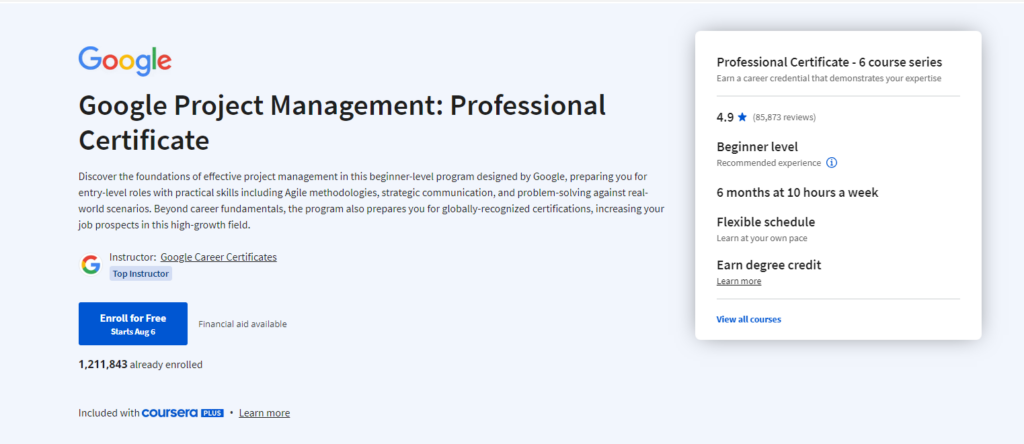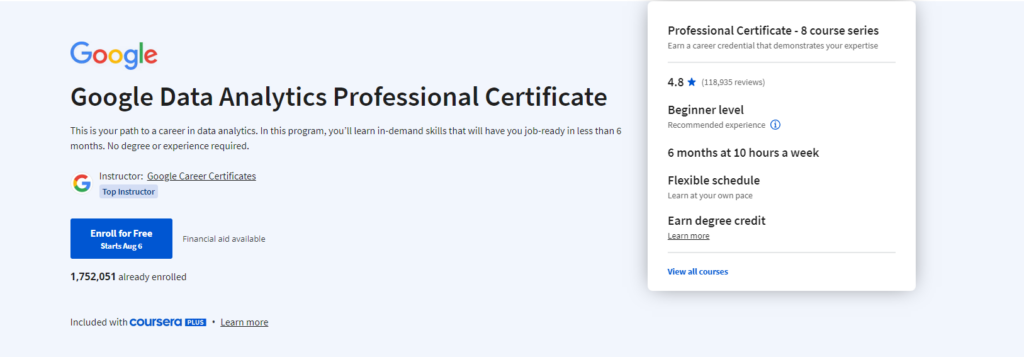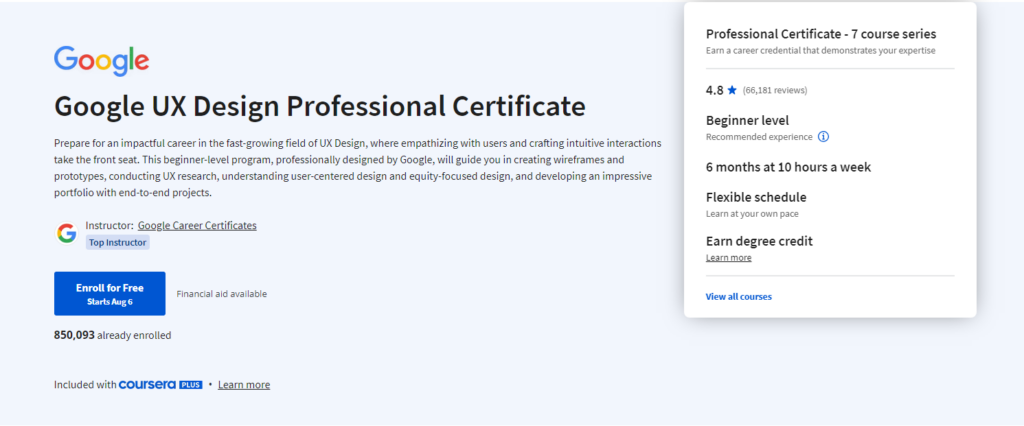In today’s competitive job market, obtaining Google certifications can significantly boost your career prospects and salary potential. These certifications provide valuable skills that are in demand across various industries. With a plethora of Google certification courses available, choosing the right one for your needs can be challenging. In this article, we’ll explore the best Google certification courses of 2023, focusing on Coursera’s Google Project Management Professional Certificate as the top pick.
Table of Contents
- 1. Coursera’s Google Project Management Professional Certificate
- 2. Digital Garage’s Fundamentals of Digital Marketing
- 3. Coursera’s Google IT Support Professional Certificate
- 4. Udemy’s Google AdWords Certification
- 5. Google Analytics Academy
- 6. Coursera’s Google UX Design Professional Certificate
- Conclusion
1. Coursera’s Google Project Management Professional Certificate

Overview: Coursera’s Google Project Management Professional Certificate is a highly regarded course that prepares learners for a career in project management. It stands out for its comprehensive curriculum, making it suitable for individuals with no prior experience.
Course Format: This course is entirely online and self-paced, allowing learners to fit it into their busy schedules. With approximately 10 hours of effort per week, students can complete the course in about six months.
Pros & Cons:
- Pros: The course doesn’t require any prior experience and offers a certificate of completion. Learners have the flexibility to manage their study time.
- Cons: The course is available only in English, and due to its comprehensive content, it may take longer to complete compared to other courses.
What you’ll learn
- Gain an immersive understanding of the practices and skills needed to succeed in an entry-level project management role
- Learn how to create effective project documentation and artifacts throughout the various phases of a project
- Learn the foundations of Agile project management, with a focus on implementing Scrum events, building Scrum artifacts, and understanding Scrum roles
- Practice strategic communication, problem-solving, and stakeholder management through real-world scenarios
2. Digital Garage’s Fundamentals of Digital Marketing
Overview: Digital Garage’s Fundamentals of Digital Marketing is an excellent starting point for individuals interested in pursuing a career in digital marketing. It offers a comprehensive, self-paced program at no cost.
Course Format: The course is delivered through self-paced video tutorials, making it easy for learners to accommodate it in their busy schedules. It covers essential topics related to digital marketing.
Pros & Cons:
- Pros: The course is self-paced and offers unlimited access. Learners can choose the modules they are interested in or complete the entire program for certification.
- Cons: As a beginner-level course, it covers only the basics of digital marketing.
3. Coursera’s Google IT Support Professional Certificate

Overview: Coursera’s Google IT Support Professional Certificate is an ideal choice for those looking to switch to a career in IT or advance their IT skills. It provides in-demand skills that can be completed in under six months.
Course Format: This course is offered entirely online and is designed for individuals with no degree or experience. It includes video content, assessments, and hands-on labs.
Pros & Cons:
- Pros: The course is 100% online, and no degree or prior experience is required to start. Learners can complete it in a reasonable amount of time.
- Cons: Similar to other comprehensive courses, it may take longer to complete compared to shorter programs.
What you’ll learn
- Gain skills required to succeed in an entry-level IT job
- Learn to perform day-to-day IT support tasks including computer assembly, wireless networking, installing programs, and customer service
- Learn how to provide end-to-end customer support, ranging from identifying problems to troubleshooting and debugging
- Learn to use systems including Linux, Domain Name Systems, Command-Line Interface, and Binary Code
4. Udemy’s Google AdWords Certification
Overview: Udemy’s Google AdWords Certification course, led by experienced instructor Daragh Walsh, offers an efficient and well-delivered entry-level course on Google Ads.
Course Format: The course is presented through on-demand videos, articles, and a practice test. It can be viewed on mobile and TV, and the price includes lifetime access.
Pros & Cons:
- Pros: Learners can complete the course in just 90 minutes, making it a time-efficient option. It includes lifetime access to course materials.
- Cons: The regular price can be expensive, but there’s an option to subscribe to Udemy for access to multiple courses.
5. Google Analytics Academy

Overview: Google Analytics Academy is the go-to choice for those interested in learning about Google Analytics. It offers a range of courses suitable for beginners to power users.
Course Format: The courses are all taught online and typically take four to seven hours to complete each. Some familiarity with Google Analytics is required for the more advanced courses.
Pros & Cons:
- Pros: The Academy provides courses for both beginners and experienced users. All courses are offered free of charge.
- Cons: Some users may find the courses less interactive and not very comprehensive compared to other options.
What you’ll learn
- Gain an immersive understanding of the practices and processes used by a junior or associate data analyst in their day-to-day job
- Learn key analytical skills (data cleaning, analysis, & visualization) and tools (spreadsheets, SQL, R programming, Tableau)
- Understand how to clean and organize data for analysis, and complete analysis and calculations using spreadsheets, SQL, and R programming
- Learn how to visualize and present data findings in dashboards, presentations, and commonly used visualization platforms
6. Coursera’s Google UX Design Professional Certificate

Overview: For aspiring UX designers, Coursera’s Google UX Design Professional Certificate offers a comprehensive program to prepare learners for entry-level jobs in UX design.
Course Format: The course is entirely online and self-paced, allowing learners to complete it in about six months. It includes video content, readings, assessments, and hands-on activities.
Pros & Cons:
- Pros: The course doesn’t require a degree or experience, making it accessible to everyone. Learners can develop a portfolio to showcase their skills to potential employers.
- Cons: Like other comprehensive courses, it may take longer to complete due to the depth of the content.
What you’ll learn
- Follow the design process: empathize with users, define pain points, ideate solutions, create wireframes and prototypes, test and iterate on designs
- Understand the basics of UX research, like planning research studies, conducting interviews and usability studies, and synthesizing research results
- Apply foundational UX concepts, like user-centered design, accessibility, and equity-focused design
- Create a professional UX portfolio that includes 3 end-to-end projects: a mobile app, a responsive website, and a cross-platform experience
Conclusion
Each of these Google certification courses offers unique benefits and caters to learners with various career aspirations. From project management and digital marketing to IT support, Google Ads, Google Analytics, UX design, and AI, these courses cover a wide range of skills and knowledge. As you choose the best course for yourself, consider your interests, skill level, time commitment, and budget. With the right certification, you can unlock new career opportunities and enhance your professional growth.



